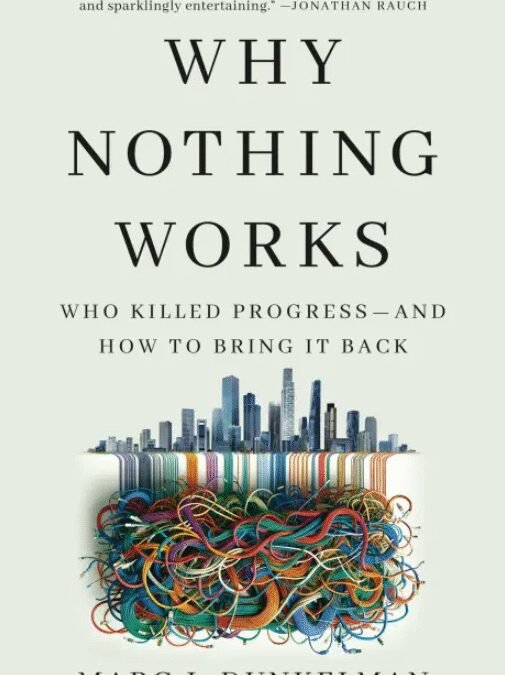
Book Review of Why Nothing Works: Who Killed Progress―and How to Bring…
Review: Why Nothing Works: Who Killed Progress―and How to Bring It Back
When I first picked up Why Nothing Works: Who Killed Progress―and How to Bring It Back by Marc Dunkelman, I was intrigued not just by the title but by the promise of deeper insights into our political and bureaucratic paralysis. Having just encountered the thought-provoking discussions in Klein and Thompson’s Abundance, I was eager to see how Dunkelman would navigate the complexities of progress and stagnation in our society. His exploration of historical frameworks, especially the tug-of-war between Hamiltonian efficiency and Jeffersonian decentralization, felt like the perfect follow-up to my recent reading.
Dunkelman’s approach is both rigorous and relatable, grounding big-picture ideas in tangible examples that resonate with anyone frustrated by the pace of change in our communities. Starting with the haunting fate of Penn Station, he unpacks the multitude of voices that can stall crucial endeavors, painting a vivid picture of a world where too many stakeholders lead not to collaboration but to gridlock. This meticulous analysis of urban planning—particularly through the legacy of figures like Robert Moses—leaves us pondering the consequences of bureaucratic indecision. It’s a narrative that feels familiar to anyone following current infrastructure debates.
One of the most striking elements of Dunkelman’s writing is his ability to transition seamlessly between engaging anecdotes and broader societal critiques. His vivid recounting of the Wollman Rink saga in Central Park illustrates the pitfalls of public bureaucracy while simultaneously showcasing the rare success of private intervention. As I read about how Mayor Ed Koch’s initial attempts spiraled into mismanagement, I couldn’t help but wonder: when did our collective ability to get things done become so frail? Dunkelman’s insights cut through the political noise, offering a refreshing clarity about the deep-rooted issues of inefficiency that plague our systems.
This book doesn’t shy away from uncomfortable truths—Dunkelman aptly exposes the irony of reform efforts that stifle innovation rather than promote it. His assertion that “rendering government incompetent is a lousy way to draw voters into an ideological movement” struck a chord with me. It’s a stark reminder that while we strive for a more equitable bureaucracy, we must ensure it remains capable of delivering results. The juxtaposition of public and private sector success stories invites critical reflection on how we can recalibrate our approach to governance.
Dunkelman’s prose is engaging and accessible, marked by a warmth that makes complex subjects easy to digest. His knack for storytelling turns what could be dry political theory into a riveting narrative that captivates and sharpens the mind. Quote after quote left me feeling as though I was sitting across from him, sipping coffee in a busy café, lost in a thought-provoking discussion.
In conclusion, Why Nothing Works is a must-read for anyone interested in the undercurrents shaping our political landscape, from frustrated citizens to aspiring policymakers. Dunkelman lays out the stakes with urgency and optimism, reminding us that while challenges abound, there’s always room for renewed commitment to progress. My reading experience opened my eyes to the interplay of systems and personalities that govern our lives, and I finished the book feeling inspired to engage with the complexities of our shared governance more actively. If you’re eager to understand why certain projects thrive or falter and are interested in the balance needed in our political ideology, this book will resonate deeply with you.
Discover more about Why Nothing Works: Who Killed Progress―and How to Bring… on GoodReads >>






